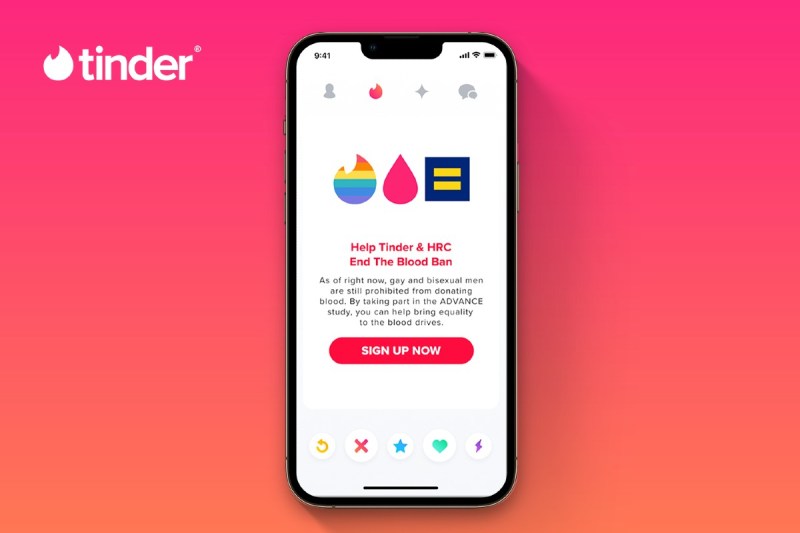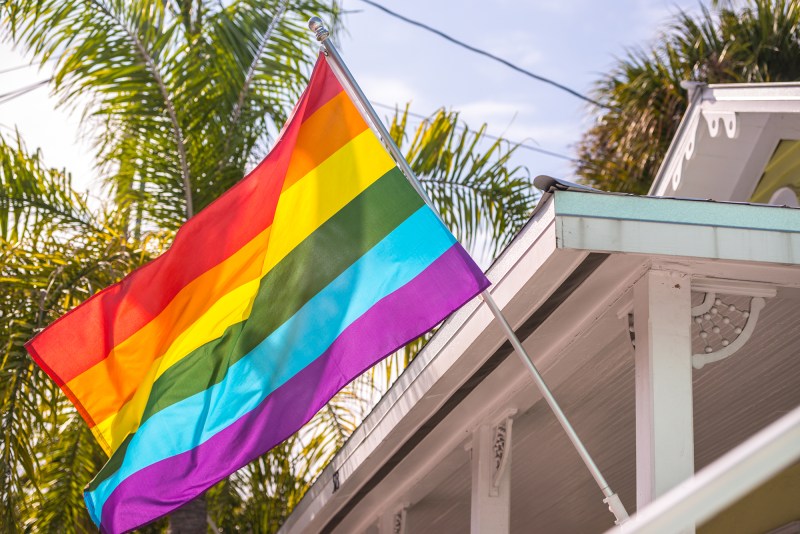After historic gains over the last four decades, resistance to LGBTQ+ reformation has been gaining momentum in the last few years. Up to 40 states have pending or passed bills restricting LGBTQ+ access, according to the Freedom for All Americans nonprofit.
In addition to combating this rising discriminatory tide, LGBTQ+ groups organize to fight legacy legislation still remaining on the books from the previous generation’s fight to establish queer rights. Fortunately for activist groups like Freedom for All Americans, today’s LGBTQ+ campaign features powerful business partners.

This Pride month, Tinder is partnering with the Human Rights Campaign (HRC), the nation’s largest LGBTQ+ and civil rights organization, to call for ceasing the ban on gay and bisexual men donating blood. Originally set in place nearly 40 years ago due to the AIDS crisis, the blood ban prevents sexually active gay and bisexual men from donating blood. From criticism and discriminatory accusations to the nationwide blood shortage, the team is calling for changes to this policy.
Why is Tinder getting involved? Because of morals and its market, CEO Renate Nyborg said in the June 1 Fortune Magazine op-ed.
“As the leader of a company built on the magic of human connection, it confounds me that people who desire to help those in need are held back by prejudiced policies,” the Tinder CEO wrote. “While I am not impacted by this policy personally, I firmly believe that caring people should be empowered to make a positive impact on society.”
Part of this awareness arises from experience. The LGBTQ+ community is Tinder’s fastest-growing user base. And its largest age group is increasingly vocal.
“Younger generations have been vocal about how they won’t engage with organizations that have policies they don’t support. More than 50% of Tinder members in the U.S. are aged 18 to 25. We are intimately connected to the issues that drive the next generation to action (or to boycott),” Nyborg wrote.
As an LGBTQ+ advocate for four decades, the reason for HRC’s participation is obvious. The group’s perspective, however, helps put a new perspective on gay and straight sexual relations.
“(The HRC) believes that donors are deferred based on their membership in a group — in this case, all men who have sex with men — rather than engagement in risky behavior, such as unprotected sex,” the HRC wrote in a press statement. “For example, a man who has had protected oral sex with another man once in the last three months is currently barred from donating blood. Yet a woman who has had unprotected sex with multiple partners over the same time frame with no knowledge of their personal histories remains in the donor pool.”
This helps to frame the term “risky behavior.” Considering advancements in testing, the blood ban also does not jibe with today’s tech, Nyborg wrote.
“The ban was implemented in September 1985, at a time when HIV was fundamentally misunderstood and feared,” Nyborg wrote. “Today, the ban doesn’t make sense, particularly when you consider the advances in HIV/AIDS prevention, detection, and treatment. All blood collected in the U.S. undergoes rigorous testing for HIV.”
Blood collection organizations like the Red Cross have to adhere to this federal policy to their detriment, preventing hundreds of thousands of would-be blood donors “that UCLA researchers estimate could treat over a million people,” said Nyborg.

In calling for change during the June Pride month, Tinder and the HRC are not only calling for an end to the ban, but also proposing a solution: Encouraging eligible individuals to sign up for the ADVANCE Study designed to help test and implement a more inclusive, nondiscriminatory policy.
The acronym ADVANCE stands for “Assessing Donor Variability And New Concepts in Eligibility.” The study will be designed to find data-supported evidence to assess individual risk for HIV infection based on risk behaviors instead of time windows regarding sexual contact with another man.
Tinder’s app is critical in reaching study participants. While the FDA has approved the ADVANCE study, more participants are needed. Potential qualifying Tinder users in eight pilot cities will be prompted to swipe right on an “All Types” Pride card in the app to learn more and possibly participate in data collection efforts.
To gather the necessary data, the blood centers will partner with LGBTQ+ hubs in Washington D.C., San Francisco, Orlando, New Orleans/Baton Rouge, Miami, Memphis, Los Angeles, and Atlanta. The ADVANCE study aims to enroll a total of 2,000 gay and bisexual men (250-300 from each area) who meet the study eligibility criteria. Eligible participants will be aged 18 to 39 years old and live in one of the eight communities where the pilot study is located.
Study results are expected in late 2022. The findings of the pilot ADVANCE study will be submitted to the FDA which will review the data and decide the next steps.



